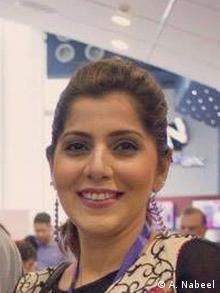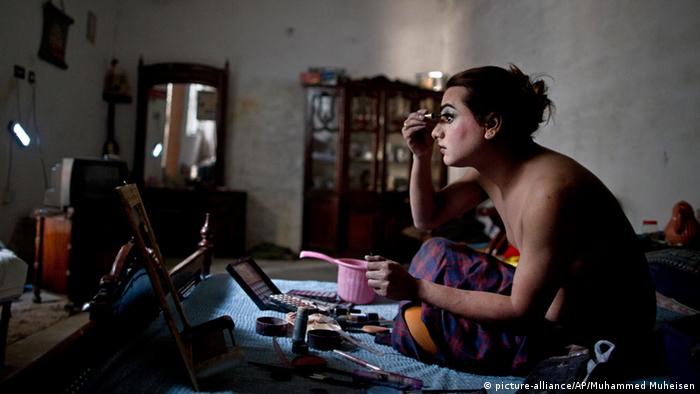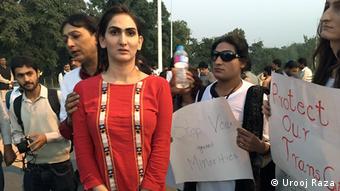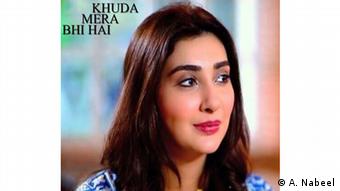By Esther Felden, Beenish Javed
Sentimental stories, love, passion, intrigue and heartache - these are typical ingredients of TV series produced to entertain Pakistan's TV audience. But now, a new TV drama program is entering unchartered territory.
A young couple is expecting a child. But soon, the parents, who have been looking forward to having the baby, are deeply shocked because their child is intersexual, something that doesn't play well in Pakistan's extremely conservative society. In real life, children who cannot clearly be recognized as a boy or a girl, are often shamefully hidden by their families and raised in secrecy. Nobody is supposed to know that there is something amiss. That's the setting of the new TV series "Khuda Mera Bhi Hai," which has been broadcast by ARY digital since late October once a week. It is the first time that a television program in Pakistan is bold enough to pick such a taboo topic and put it on the air. For Pakistani standards, the title is also bold: "God created me too" - it roughly translates into English.
The program shows the day-to-day situation of intersexual people and their families in a brutally open way. What does such a fate mean for a family? How differently do fathers and mothers deal with the situation? How do relatives react? Yet, the title suggests that the program is pleading for more openness and tolerance.

Asma Nabeel: 'I wanted to write about something that has a real effect on the lives of the audience'
Asma Nabeel wrote the screenplay of "Khuda Mera Bhi Hai." It was her first piece for television. "This is my first TV series," she told DW. "I wanted to write about something that has a real effect on the lives of the audience. According to her, the media should take the lead when it comes to addressing topics like that. With her TV project, she wants to play an active part in eliminating the taboos surrounding intersexuality. But today, she admits, her country is a long way from achieving that. "Parents with an intersexual child often don't even speak about it." The protagonists in the series do speak, but they also show how difficult it is to deal with the topic. And that family members react in so many different ways.
A boy who doesn't want to be one
The mother is the focal point of the program. She loves her child and wants to fight for her child's rights, to the dismay of even her husband and closest relatives. "Her familiy and her husband put a lot of pressure on her," Nabeel explains. After giving birth in the hospital, the doctors tell her that her baby is intersexual; that is it is born with a reproductive or sexual anatomy that doesn't seem to fit the typical definitions of female or male. Her mother-in-law persuades her son to give the baby away. After they have left the hospital, the parents take the newborn to a house where transgender women live - women, who were born as men but could never identify themselves with their biological sex. They leave the newborn at this house. The mother, who is in a state of shock, lets it happen.
But that's not the end of the story, as the audience can tell from watching the opening titles. They show pictures of the child growing up with its parents. The child is dressed and raised as a boy. But it is clear that he isn't happy with the decision of his parents and that deep down he intends to be a girl. One sequence shows the child in front of a mirror, putting lipstick on and posing with a scarf which is briskly taken away by the mother.
By showing scenes like that, "Khuda Mera Bhi Hai" takes up the transgender issue, which rights groups say is quite common in Pakistan, but mostly kept under wraps. "There are no official statistics. The Pakistani government estimates that there are a million transgender people in the country. However, we think there are more than two million," says human rights activist Qamar Naseem who works for the transgender organization Trans Action Alliance (TAA).
Celebrated on stage, despised in daily life
Transgender people are welcome as dancers at wedding parties. But in daily life, they live on the margins of society - despite the fact that the supreme court of Pakistan officially acknowledged them as a third sex. "In our society life is extremely hard for them," said Asma Nabeel. "It is even taboo to talk about them."
She thinks this is the major reason many people don't know anything about the issue and the problems these people have to face every day. Again and again, transgender people in Pakistan are victims of violent crimes. They are humiliated, get beaten up or they are raped. And sometimes they are killed. "From January 2015 to May 2016, 46 transgender people were killed in Khyber Pakhtunkhwa province alone," said Qamar Naseem. On top of this, there were more than 300 assaults or rapes.
A victim's story
In November, one incident made headlines even outside Pakistan. A video was posted on the internet, showing the ordeal of a transgender woman. The video shows how she was tortured and lashed with a leather belt. The main perpetrator puts his foot on her neck, twists her arm and lashes at her exposed buttocks.
The abusers are members of a criminal gang. None of them was disguised and could be identified and arrested by the police. The victim, Shaniya, survived and talked about her ordeal. "I came to Punjab province to perform at several weddings," she told DW. When she came home after her dance performance one evening, there was a knock on her door. A group of men stormed into her room. "I was beaten and forced to drink urine. Then they stole my jewelry." The men spared her life, but Shaniya is scared for life. "I am glad the police arrested them. But I am scared that they will be released soon and that they will come after me."
According to the initiative "Forum of dignity," her concerns are not that unrealistic. In a year's time something like that happened twice, says Uzma Yaqoob, the spokesperson for the NGO. "The offenders were arrested, but released shortly after. The system obviously has flaws." She demands the Pakistani government to put in place measures to protect transgender people like Shaniya.
Can a TV series change public opinion?
Qamar Naseem, from the Trans Action Alliance NGO, says that Pakistan's society needs to change its attitude toward intersexual and transgender people. A TV series like "Khuda Mera Bhi Hai" will not be able to entirely change public opinion. However, said Naseem, "the TV series is a good initiative to raise awareness on intersexuality and transgender issues in society."
The audience does not know yet, which way the child's story in "Khuda Mera Bhi Hai" will develop. Five episodes have been broadcast so far. In the latest part, the mother is plagued by her conscience. She realizes that her decision to give away her child was terribly wrong and she now wants to have it back. In the preview of the next episode she meets a mother with a disabled child. She asks her if it was difficult to raise such a kid and love it. The woman answers: "No, not for a mother. God always gives a mother the power to love and raise her child."
The protagonist also feels that she is capable of offering this love and wants to have her baby back as soon as possible. But when she arrives at the house, where her baby is supposed to live with the transgender women, she is told that the children who were accepted in this house won't be easily given back to their parents. The horror in the eyes of the mother is the emotional cliffhanger for episode 6.






No comments:
Post a Comment